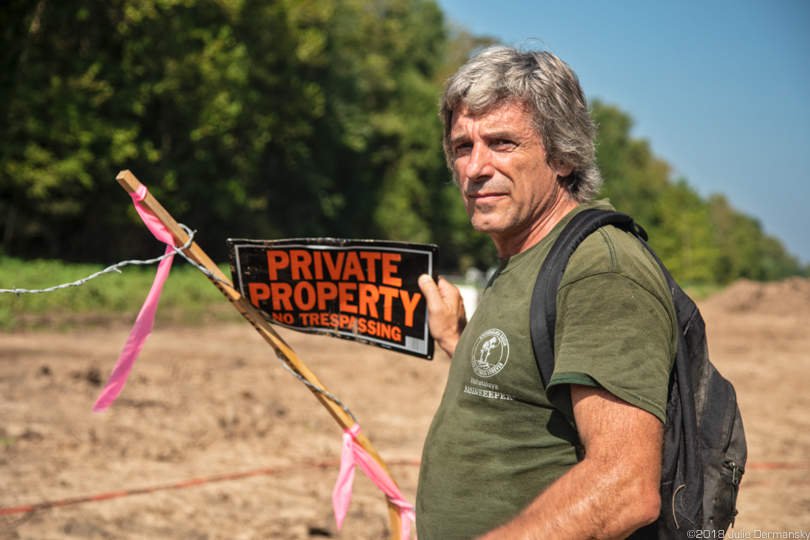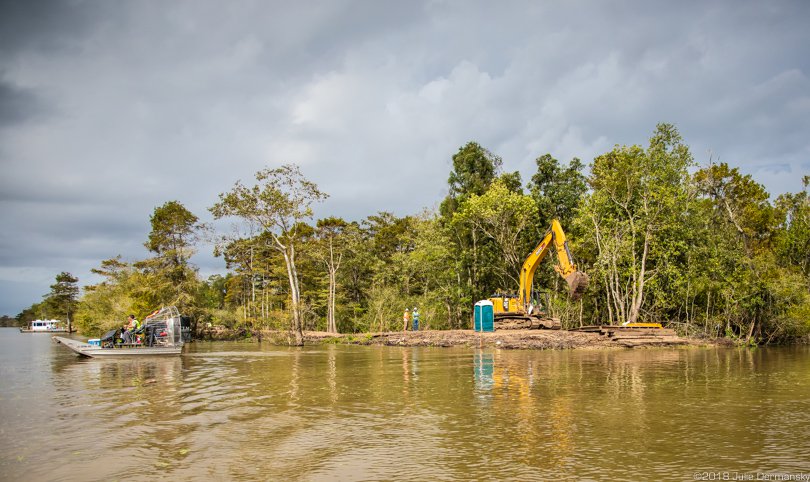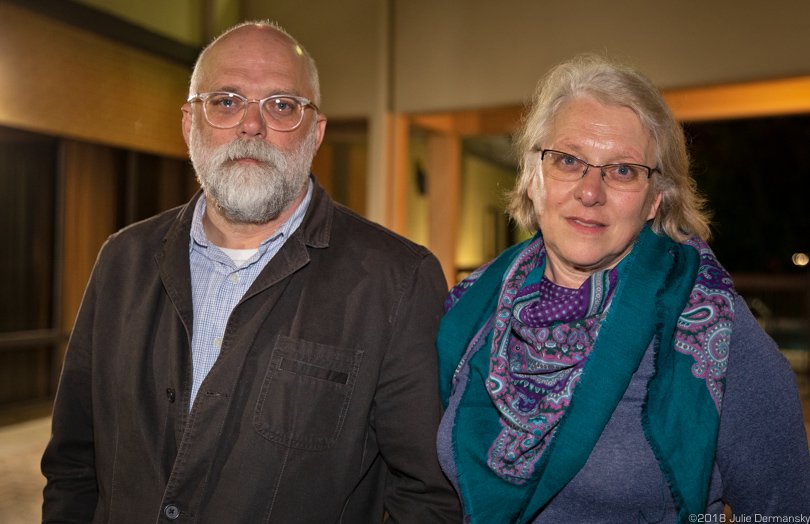
Truthout is a vital news source and a living history of political struggle. If you think our work is valuable, support us with a donation of any size.
After three landowners filed a legal challenge against Bayou Bridge Pipeline, LLC’s right to build a pipeline on their land — which it did without their permission — the case concluded this week with a very small fine for the company.
On December 6, Louisiana State Judge Keith Comeaux fined the pipeline company $450 for trespassing during construction before properly obtaining permission. The judge also granted the company the permission it sought to expropriate the land it had already built on.
The legal challenge came almost a year after construction began on the 163-mile-long Bayou Bridge pipeline, which spans southern Louisiana from Lake Charles, near the Texas border, to St. James, on the banks of the Mississippi River. The controversial pipeline is the tail end of a crude oil pipeline network that will transport Bakken oil from North Dakota to the Gulf Coast, likely for export.
“The Court should not supplant the well-thought and well-researched opinions of the various agencies that permitted this project,” Judge Comeaux wrote in his ruling, according to The (Baton Rouge) Advocate. “Therefore, the Court finds that the proper permitting has been done, and that the public purpose and necessity has been proven by Bayou Bridge Pipeline, LLC.”
The ruling stated that each landowner was entitled to $75 for their share of the land in question — which Bayou Bridge argued would only net $1.11 combined if the land was put up for sale since the land was shared by so many others. The judge also awarded each landowner an additional $75 due to the trespassing offense.
A Battle Over a Pipeline and Property Rights
Filed on behalf of brother and sister Peter and Katherine Aaslestad and Theda Larson Wright, the lawsuit alleged that the pipeline does not serve public interests, which is at the crux of the state’s authority to grant eminent domain. The suit claimed that adding another pipeline to Louisiana’s extensive pipeline network causes more harm than good.
Pipelines have contributed to Louisiana’s coastal erosion crisis, and building a new pipeline continues the state’s reliance on fossil fuels, which is the main contributor to climate change. In addition, according to the suit, the extensive spill and leak record of Energy Transfer (formerly Energy Transfer Partners) and its affiliates, which share ownership in the pipeline, jeopardizes the public’s interest because a spill could cause irreparable environmental damage in the Atchafalaya Basin, the nation’s largest river swamp and a national heritage area.

Bayou Bridge Pipeline, LLC maintained that the company did due diligence trying to obtain permissions from all the landowners along the pipeline route, and that the pipeline is good for commerce. While conceding it hadn’t received permission from the three plaintiffs, who have interests in a 38-acre parcel of land in the basin, the company did gain permission from hundreds of others who also have a stake in the same parcel.
During a three day hearing last week, the plaintiffs’ lawyers, Pam Spees of the Center for Constitutional Rights, Misha Mitchell of Atchafalaya Basinkeeper, and Bill Quigley, a law professor at Loyola Law School, argued that the pipeline company’s right to expropriate their clients’ land violates the landowners’ right to due process and right to property under the US Constitution. They plan to continue that challenge in their appeal of this ruling.
“We want the courts to overturn the expropriation and take the pipeline out of the ground,” Quigley stated.
A statement released by Energy Transfer said it is pleased with the ruling. Despite being found guilty of trespassing, the company wrote: “We are committed to following all the appropriate laws and regulations that govern our business.” It also wrote that it looks forward to bringing the pipeline into service before the end of the year.
During a livestreamed interview after the hearing concluded on November 30, Spees questioned how the judge could determine the benefits of a pipeline if he does not also consider the harm.
“Worldwide, the demand for oil is expected to be in a serious decline in the next five years,” Spees said. “And here they are touting this pipeline as though it’s going to bring this huge economic benefit to Louisiana, when the rest of the world knows the demand is declining — as it should be, given the report that the US government just issued last Friday that shows that we are in an alarming state of crisis when it comes to climate change.”
The Aaslestads Intend to Stand Their Ground
That night I called Peter and Katherine Aaslestad and spoke with them about the hearing. Both were taken aback by Bayou Bridge’s lawyers’ insistence that their land has little to no value.
During the hearing, the Bayou Bridge lawyers tried to make the plaintiffs out to be greedy out-of-towners looking for lots of money. Though the Aaslestads are not Louisiana residents, they told me they have “deep family connections in and to the state of Louisiana and that we considered it ‘home’ throughout our childhoods even as our family resided outside the state.”
The landowners say their challenge wasn’t about money, rather it was about protecting land that they believe is priceless. “We are not in it for the money but for our love of Louisiana,” the Aaslestads told me.
The plaintiffs’ lawyers sought a hefty fine from the company for trespassing, which they meant as a message that corporations are not above the law, not to make the plaintiffs rich. If there had been a large settlement, the Aaslestads planned to donate it to those fighting to protect the land in the Atchafalaya Basin.

In response to questions I sent before the judge valued the disputed land at $150 per landowner, the Aaslestads wrote the following:
“We tried to emphasize that the property in question is not valueless vacant land as identified by the land appraiser during the trial. The property is part of a larger vital and vibrant ecosystem filled with life that includes trees, wildlife, fish, and birds, and plays an important role in the economic health and well-being of the state beyond its borders.
From the start, win or lose, we hoped that our effort to call [Bayou Bridge Pipeline, LLC] to task for trespassing would encourage other landowners in the state to assert their constitutional rights to protect their land from pipeline degradation. We also hoped to raise awareness of [the] environmental importance of the Atchafalaya Basin and the unlawful actions of Bayou Bridge Pipeline by trespassing and building a pipeline on the property before they secured consent from all landowners.”
Neither of the Aaslestads see themselves as environmental heroes, though they acknowledge “opposing a billion-dollar company that is used to getting its way requires a lot of internal strength (it is very frightening and expensive), as well [as] support from outside.”
They feel privileged to fight for the land itself and for other landowners who never signed easements with the pipeline company but were unable to find a voice for their opposition to eminent domain used for private gain.
After hearing the verdict, Peter Aaslestad expressed his frustration, writing to me:
“The Bayou Bridge pipeline (BBP) has appointed itself the power of eminent domain, citing a bogus notion of the public good (they define it as ‘more product in the stream of commerce’). All the while, BBP has been trespassing on and damaging individual landowners’ properties that BBP seems to deem worthless. In fact, the exact opposite is true: These lands have incalculable value as part of the Atchafalaya Basin. Its mere existence — untouched, as is — serves more public good than BBP can ever promise. So in a ‘Cost Benefit Analysis,’ the BBP project […] runs a deficit to the public good.”
He believes the company’s claim to eminent domain has no merit at all, and plans to fight on with the appeal.
A terrifying moment. We appeal for your support.
In the last weeks, we have witnessed an authoritarian assault on communities in Minnesota and across the nation.
The need for truthful, grassroots reporting is urgent at this cataclysmic historical moment. Yet, Trump-aligned billionaires and other allies have taken over many legacy media outlets — the culmination of a decades-long campaign to place control of the narrative into the hands of the political right.
We refuse to let Trump’s blatant propaganda machine go unchecked. Untethered to corporate ownership or advertisers, Truthout remains fearless in our reporting and our determination to use journalism as a tool for justice.
But we need your help just to fund our basic expenses. Over 80 percent of Truthout’s funding comes from small individual donations from our community of readers, and over a third of our total budget is supported by recurring monthly donors.
Truthout has launched a fundraiser to add 340 new monthly donors in the next 5 days. Whether you can make a small monthly donation or a larger one-time gift, Truthout only works with your support.